Starting and growing a small business often involves making the most of a limited budget. Marketing strategies on a tight budget can be challenging, so we turned to other small business owners for their insights. Here’s a blueprint, compiled from industry expert advice, about how to effectively use $1000 to boost your small business marketing efforts – along with our comments.
1. Networking, relationship building, and community engagement
Networking, relationship building, and community engagement are really important for small businesses looking to grow, especially on a tight budget. While these activities are free in terms of money, they require an investment of time and effort – so take that into consideration. Establishing meaningful connections and attending networking events can lead to invaluable opportunities and long-term success. You can do that both offline and offline – this example from Connect Nashville Networking shows both online opportunities (a special Facebook group) and offline meetings (Happy Hour evenings):
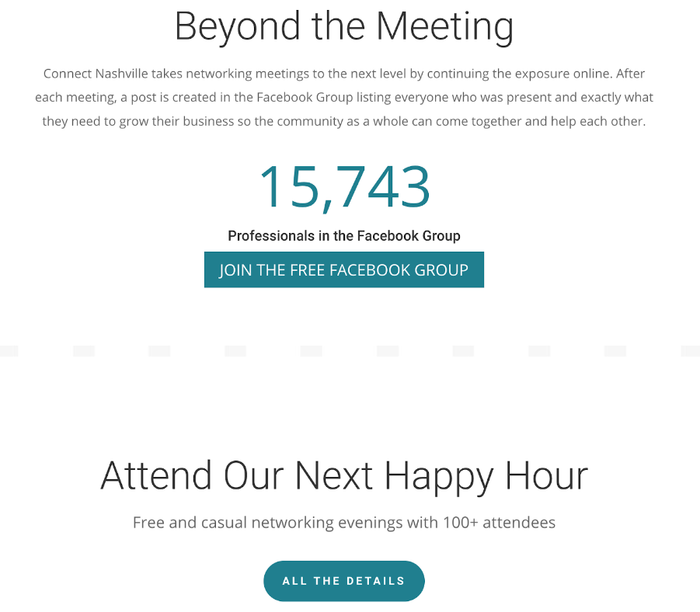
Malize Evans, Co-Founder and CMO at Raftur Games, emphasizes the importance of relationships: "Establishing meaningful relationships with people who may become your customers is essential. Attend networking events and meetings in your field, digitally or physically. Always offer to help before requesting anything from them." This approach helps you build trust but also positions you as a valuable resource within your community.
Nicole Crocker from Small Business Marketing Solutions highlights the power of referral networking groups. "A referral networking group provides access to a team of 20+ individuals invested in your growth and can lead you to other valuable resources." Even a small, isolated group can be a rich source of leads, support, and collaboration – so that you can expand your reach and get more clients without significant financial investment.
Mari-Liis Vaher from Powerful Marketers advises small businesses to "Invest in building and engaging the community that would benefit the most from your value. This includes using targeted ads to reach a specific audience and collaborating with local influencers." With community engagement, businesses can cultivate a loyal customer base and improve their reputation within their target market.
The right community engagement strategy can also be a great kick-off for more advanced activities – such as running a customer loyalty program or starting to practice corporate social responsibility schemes.
She continues: "It is more controllable than relying solely on social media followers and their constantly changing algorithms. But be aware of not overwhelming your audiences.". You shouldn't stop here – "Also, from the people in your community events – ask them to bring a guest next time or spread the word. Authentic testimonials and real-life experiences provide social proof, crucial for establishing trust with potential customers. People will always do some background searches, and you want to ensure they can ensure you are trustworthy."
Networking and building relations may not require much spend, but the time and effort invested can yield substantial returns in customer loyalty, support, and brand awareness.
2. Leveraging free marketing tools
Many marketing tools can be expensive, but numerous free options can help small businesses maximize their reach without straining their budget. Utilizing these tools effectively is essential for new businesses striving for rapid growth and customer retention in a competitive market.
Perry Jones, Senior Vice President at Kearsedge Boston Group, suggests starting with free business listing services such as Google Business Profile, Yelp, and Apple Business Connect. "Getting listed on these platforms increases your visibility without costing a dime," he notes. Even a single listing can improve your online presence and make it easier for new customers to find and engage with your business – so you shouldn't neglect it.
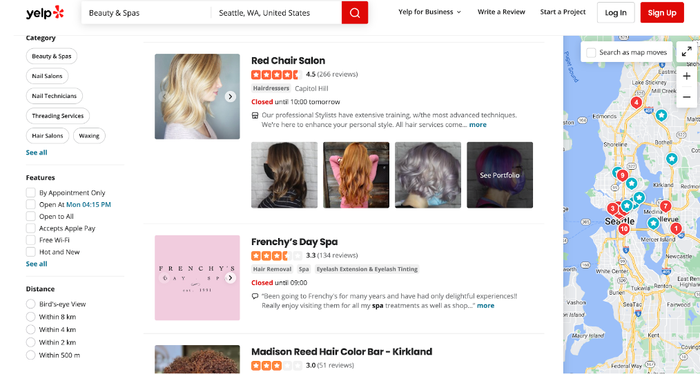
Jackie Strack, COO at D-Kode Technology, also emphasizes leveraging free marketing options and casts another vote for Google Business Profile: "These would include setting up a Google My Business profile, enacting consistent posting on social media channels, setting up Google Analytics, Google Search Console, building out an email newsletter, and tracking analytics on social media and email marketing." With such a variety of tools, small businesses can monitor their digital marketing efforts, refine their strategies, and respond to customer interactions more effectively.
Additionally, Jones recommends running low-cost Facebook engagement ads. "Spend just $5 a day on Facebook 'engagement' ads for 20 days. The goal is to get people to comment or like your post, and this could be a significant indicator of interest in your business." Following this approach, you can generate leads and increase market share without spending too much on expensive lead generation strategies.
Using free marketing tools and low-cost strategies is important for many small businesses. By leveraging these resources, small business leaders can achieve sustainable growth and improve customer retention.
A free CRM can make all the difference in managing customer relationships effectively. Capsule CRM, for instance, offers a free version that helps businesses organize their contacts, track leads, and enhance their sales process without additional costs.
In the long run, these efforts contribute to the development of a successful business, benefitting both the entrepreneurs and the wider community.
3. Smart product sampling
Product sampling is a powerful and cost-effective way to market your small business. Roberta Perry, Founder of ScrubzBody Skin Care Products, emphasizes this strategy's impact: "I would use the budget to get a small jar of our sugar scrub into as many hands as possible. No printed ad or social media post can do as much for us marketing-wise as giving it out for people to try." This hands-on approach allows potential customers to experience the product firsthand, as it creates a more personal and memorable connection than traditional advertising methods.

Donating products in corporate gift bags at local events and networking gatherings can massively promote your product. Potential customers can touch, feel, and see your product immediately – increasing the likelihood of future sales and customer retention.
Perry Jones also followed that pattern: “A friend and I owned a small "convenience" type store in a small town. We got matchbook covers, mugs, calendars and refrigerator magnets with our brand name on them and handed these out free. We had several people come in - even months later - saying they had seen our name on a matchbook or calendar. We also had t-shirts and hoodies made with our brand on them. The hoodies sold, the t-shirts we couldn't give away. Exact same design, just people like hoodies, I guess. Total cost of "Brand Awareness" about $500.”
As you can see, in many cases, you don't need to pay extra for it – you only pay for the products you decide to give away, however, those are often already produced, so they don't incur any extra costs for you.
4. Social media marketing
Social media marketing is a critical and cost-effective strategy for small businesses aiming to grow their reach and credibility. While social media platforms are free to join, you should be prepared to invest time and effort to maintain your pages.
Not only are platforms like Facebook and Instagram important for small businesses, but B2B social media platforms such as LinkedIn also play a key role in building professional credibility and connections. As Perry Jones emphasizes, "Be very visible on LinkedIn. Although recent changes in the algorithm will make you struggle to get views to your posts, the important thing is that if you're looked for you can be found, and this generates credibility." This presence is essential for small businesses aiming to build trust and authority in their fields.
Teresha Aird, CMO at Custom Neon, highlights TikTok's potential for viral content: "Leverage the split-screen feature to offer humorous rebuttals to trending videos related to your business." With this approach, you can tap into trending topics but also ensure your content is relevant and engaging, which can help you grow your business quickly.
She continues: Begin by searching for a relevant topic (e.g., ‘finance’). Use the three-dot menu to refine your results, ensuring you target only current, popular content. Scroll through the filtered results and pinpoint videos featuring a blue searchable keyword in the comments. This keyword indicates high search volume and relevance. Craft a split-screen video where your brand humorously rebuts or adds a twist to the trending video. Incorporate the blue keyword early in your video or caption to boost discoverability. The beauty of this strategy is that it combines trending relevance with niche targeting, ensuring your content is both timely and targeted."
TikTok is a great place to discover inspiring stories. One example is a heartwarming tale about a small business selling hand-drawn t-shirts. The shirts are designed by a man who overcame a stroke, and his niece is helping him run the business:

Engaging on social media requires businesses to be constantly active and responsive. You can't simply turn off social media at 5 pm after work. Instead, you need to monitor interactions and be ready to respond to comments and messages promptly. Being genuine can help create a strong connection with your audience, which is vital for building a loyal customer base for years to come.
Hagop Imasdounian from H and Co also shares an interesting angle here:
For small business owners starting their first marketing venture with a thousand-dollar budget, I'd say the strategy hinges on the nature of their business. Is their offering a "pull" product/service, or a "push" product/service? Here’s the difference:
Pull Products/Services: Clients are actively seeking these out. Invest your budget in search engine marketing. Paid search ads on Google and Bing are essential, with Bing offering a cost-per-click up to 70% lower than Google, stretching your dollar further.
Push Products/Services: Here, you need to define your ideal customer profile. Target these customers through social media ads on platforms like LinkedIn, TikTok, or any other relevant medium.
5. Creative contests and user-generated content
Creative contests and user-generated content (UGC) can be incredibly effective strategies for small businesses looking to engage their audience and boost their online presence. Tommy Le, Founder of Poshwatch, suggests starting a contest to get people excited about your business. "Contests are fun and can get your audience to interact with your brand without spending a lot of money. Ask your followers to create their own content for your business, like taking photos with a specific hashtag."
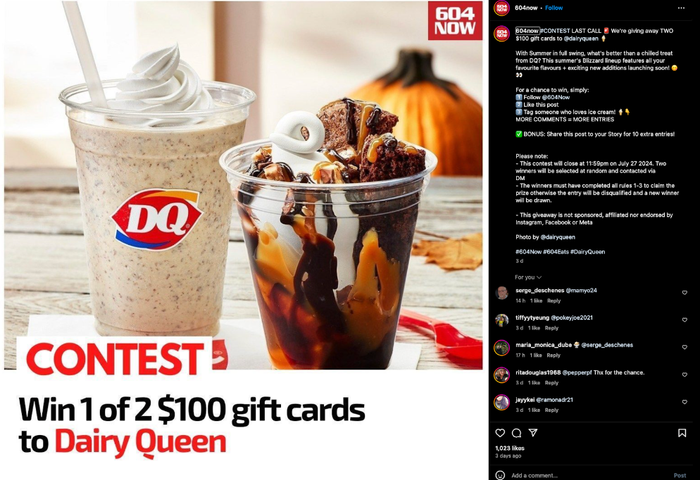
Teresha Aird further highlights the effectiveness of user-generated content as well. "We offered heavily reduced signage to local businesses in exchange for UGC. This strategy improved our rankings and significantly increased our followers." When you decide to incentivize customers to create and share content, you can amplify your reach and enhance your credibility.
She continues "The pandemic provided the catalyst to this. We were still in our infancy and 30% of our business was wiped out overnight. Needing to tighten the purse strings, but pivot our marketing, we offered heavily reduced signage to local businesses in exchange for UGC. We also held a competition on Instagram, where previous customers posted images of their signs and tagged CN. (The winner receives a Custom Neon voucher).
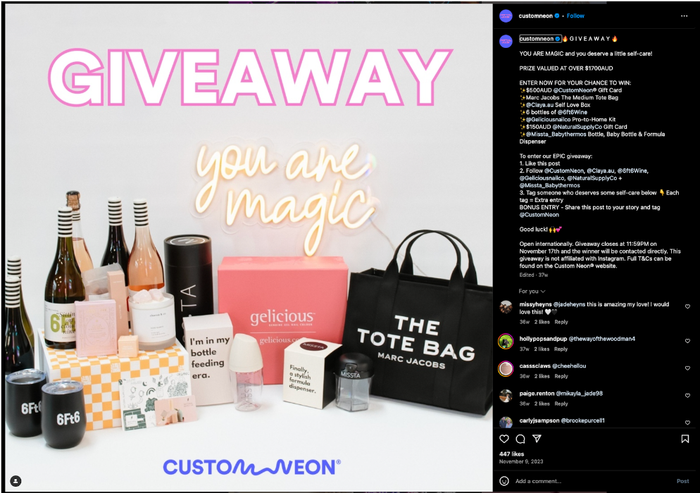
One of the terms of entry was that you had to follow our Insta, tag @customneon and we had full permission to use the imagery for marketing and PR. This gave us a bulk of content so we could vastly increase our website and social media imagery. Customers sharing their images became advocates for our brand and our followers significantly increased. Such a simple strategy improved our rankings, as we could add a lot more content and keywords to our site. This also showcased our capabilities. For a business with photogenic products, this is a strategy I'd suggest."
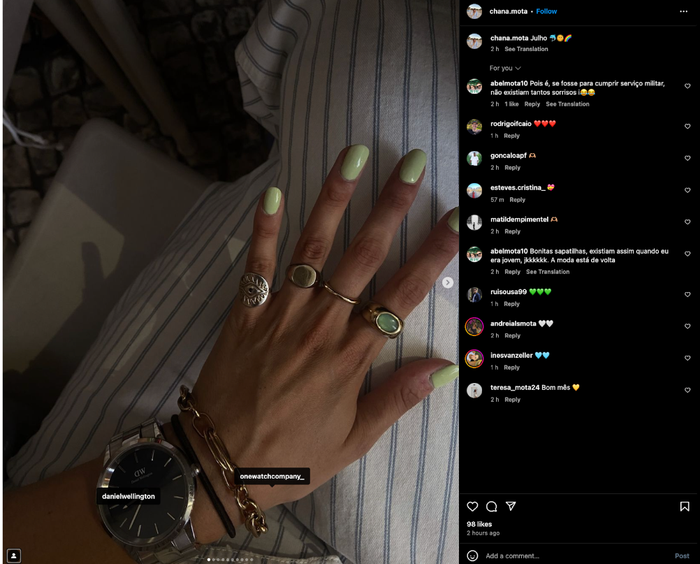
Implementing these strategies can be especially beneficial in the early stages of business ownership, helping to grow your business by leveraging the creativity and enthusiasm of your customers. Contests and UGC are also valuable for new business locations, as they create buzz and attract new customers quickly.
Moreover, these tactics are cost-effective, requiring minimal financial investment while providing substantial returns in terms of customer engagement and brand visibility.
6. Influencer marketing
While user-generated content (UGC) can be a great and powerful tool for engaging customers, it comes with the risk of unpredictable brand representation. Influencer marketing provides a way to tackle this challenge as it offers more control over how your brand is showcased.
Sam Speller, CEO of Kenko Tea, underscores the impact of influencer marketing: "We spent $400 on creating social media content and $600 on partnering with an Instagram micro-influencer. The influencer's post significantly increased our site traffic and engagement, translating to a healthy ROI." Even a small influencer campaign can allow businesses to leverage the influencer's established audience and credibility to boost brand visibility and drive traffic.
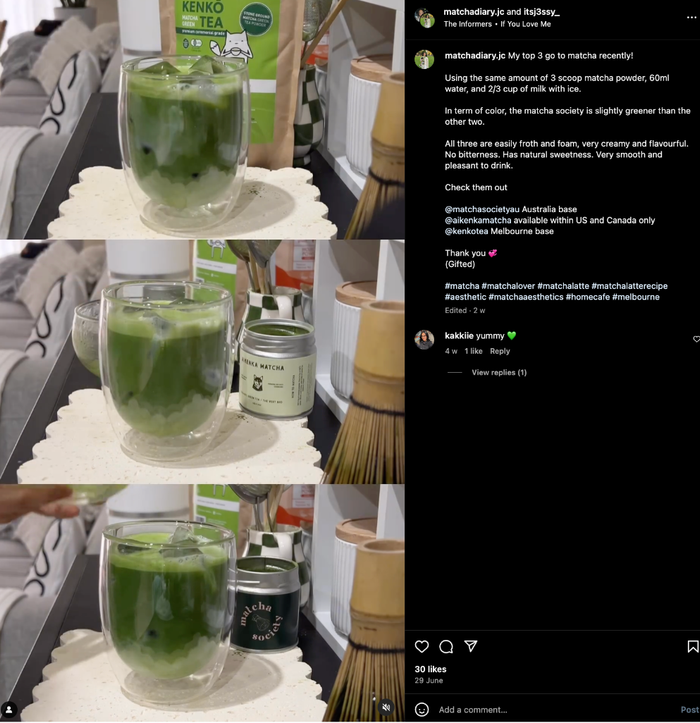
As a small business grows, influencer marketing can be especially useful for increasing revenue and building a customer base. For example, if you just released some sustainable products, you can start looking for some eco-aware influencers on Instagram or TikTok and offer them your products in exchange for a review.
If you collaborate with influencers who align with your brand values and target market and appreciate your products, you can ensure your business is presented in a positive and appealing light.
7. Public relations and thought leadership
Public relations (PR) and thought leadership are invaluable strategies for small businesses looking to enhance their visibility and credibility.
"PR is the most cost-efficient way to get your story out," says Paige Arnof-Fenn, Founder & CEO of Mavens & Moguls. "Activities like being quoted in articles, speaking at conferences, and building your social media following contribute to increasing your awareness and building credibility." Investing in PR can provide long-term benefits, positioning you as a thought leader and market influencer, which is more impactful than traditional ads.

For example, PR activities for veteran-owned businesses can involve the founder being featured in articles about veteran entrepreneurship, speaking at industry events, and actively building a social media presence that highlights their commitment to quality and community.
Anyone with a big budget can buy an ad but to have trade journals and media folks mention you as a market leader or quote you in an article carries a lot more weight and perception is the reality in marketing, so you get a lot more bang for your marketing buck with PR in my experience. Bill Gates was once quoted as saying, “If I was down to my last dollar, I’d spend it on public relations” so I am in good company, I think! – Paige continues.
Andy Langdon from Good Pictures shares his approach: "We decided to spend ~$1,000 for a 1-year membership to a prominent industry-specific online publication. This membership allows us to write and publish articles on their website to an industry-specific audience, providing hyper-targeted visibility within our industry".
8. Local SEO
Local SEO is an essential strategy that most businesses cannot afford to overlook, especially if they operate brick-and-mortar locations.
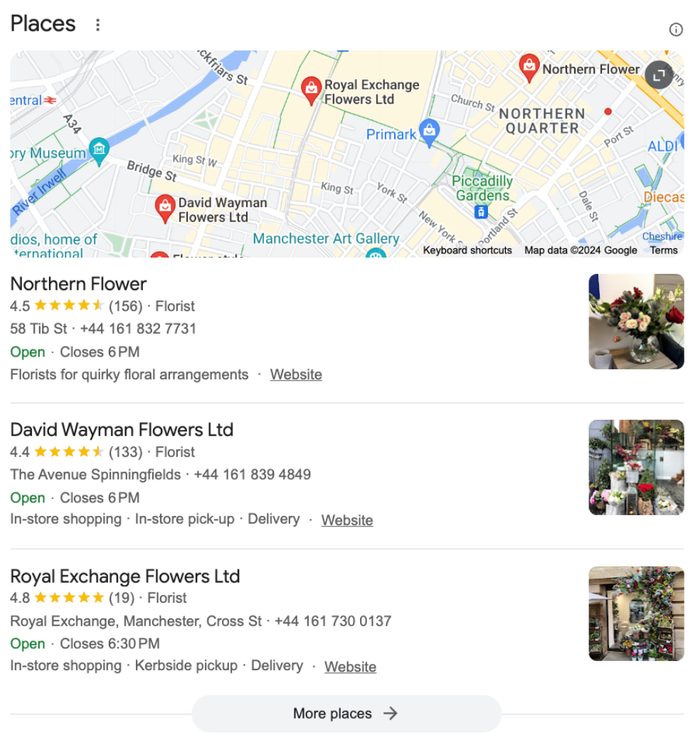
Gal Cohen, Field Area Manager at JDM Sliding Doors, recommends investing in local SEO: "About $400 would be spent optimizing our Google My Business listing and improving local citations to ensure we appear in local search queries". Doing so boosts visibility, leading to increased inbound inquiries and foot traffic. For businesses aiming to attract local customers, local SEO is a cost-effective way to improve their online presence and drive tangible results.
Building a strong local presence doesn't stop at online optimization. It's equally important to ensure that potential customers can easily find your physical location. This is where additional marketing plays a huge role.
Peter Jones suggests local newspapers: We also had 1 inch square ads in a couple of local newspapers. This cost us about $250 at the time, but it was actually a big draw – people were still reading newspapers back then.
Maria Bocharova from Quandoo suggests investing in visual marketing: "Create a clear signboard to help the local audience know that you are around. Additional signs on the street that direct clients to your place are one of the first and very important things to do".
9. Conversion Rate Optimization (CRO)
Bethan Vincent, Managing Partner at Open Velocity, emphasizes the importance of investing in CRO: "I'd spend that money getting someone with real marketing and messaging expertise to review your website and make CRO recommendations. No amount of ad spend can compensate for a poorly optimized site that fails to convey your value proposition."
A well-optimized site is essential for capturing the full potential of all other marketing efforts. If your website isn't effectively converting visitors, you risk falling victim to the "leaky bucket syndrome," where potential customers slip away due to poor user experience or unclear messaging.
10. Educational workshops
Hosting educational workshops is another way to engage with customers and drive sales. Perry Jones illustrates the success of this approach: "We organized workshops around several products we had in the store. For laptops, we offered an 'Introduction to Computers for Seniors' workshop. For musical instruments, we had a person come in to give guitar lessons, and we also organized free drum workshops. We sold a few drumsets that way, but we sold a lot of drumsticks."
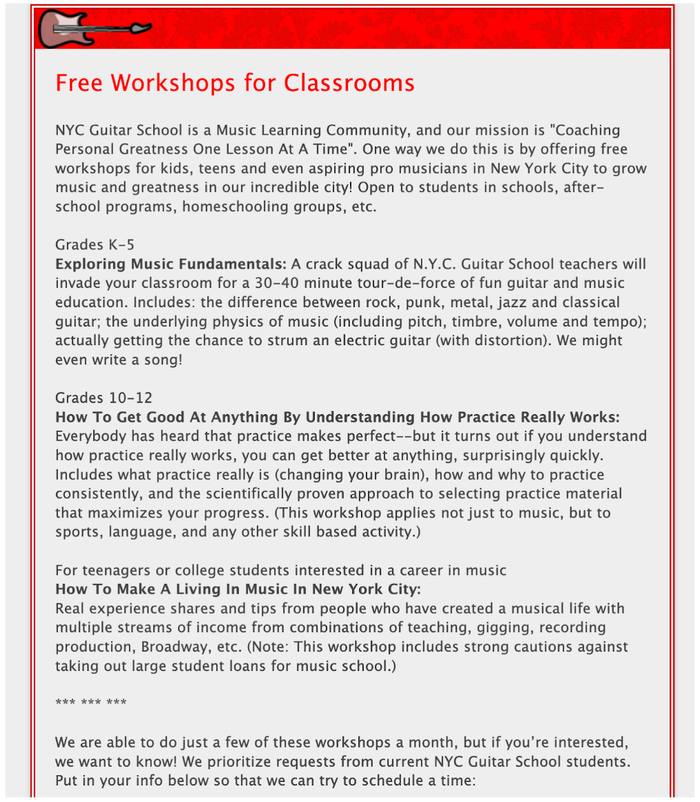
These workshops serve as a dual-purpose strategy.
They can be helpful for boosting product sales – but another goal is to establish your business as a local knowledge hub and go-to place when someone needs services like yours. By offering valuable learning experiences, you attract a wider audience and show them how to use your products in practice.
11. Content marketing
Content marketing is a powerful and quite cost-effective strategy for small businesses looking to establish their expertise and engage with their audience. Kinga Edwards, CEO of Brainy Bees, highlights its potential:
"Having a whole bunch of free tools and info to grow your small business. For free. Sounds crazy, right? But so many small shops are missing out! Even a few minutes a day can make a huge difference. How? For example, a bakery could tackle content marketing by sharing tips on allergies, yummy recipes, and local hangouts. The possibilities are endless – you only need to give them a go."
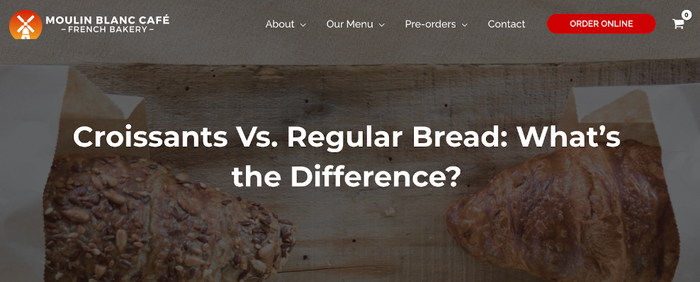
Businesses can attract and retain a clearly defined audience, ultimately driving profitable customer action. Whether it's a blog, video series, or a webinar, content marketing allows businesses to share their knowledge and connect with customers on a deeper level.
For many of those customers, that piece of content will be the very first touchpoint with the brand – that's why it's important to invest time and money into some content magic.
Conclusion
Combining these expert strategies can help you maximize your $1000 marketing budget. From networking and leveraging free tools to influencer marketing, local SEO, and hyper-targeted memberships, each strategy offers a unique way to enhance your business visibility, credibility, and engagement, leading to sustainable growth!
![$1000 Blueprint for small business growth [+Expert tips]](https://cdn.sanity.io/images/poftgen7/production/ad2b71bd5dd0002829625a18b9ebec2d900fb8dc-7680x4320.jpg?w=800&h=450&q=100&fit=max&auto=format)


![Business statistics every business owner should know [2026]](https://cdn.sanity.io/images/poftgen7/production/5619faf6a65f53406d3e554c11c9e894402d4397-5760x3240.jpg?rect=5,0,5751,3240&w=300&h=169&q=75&fit=max&auto=format)
